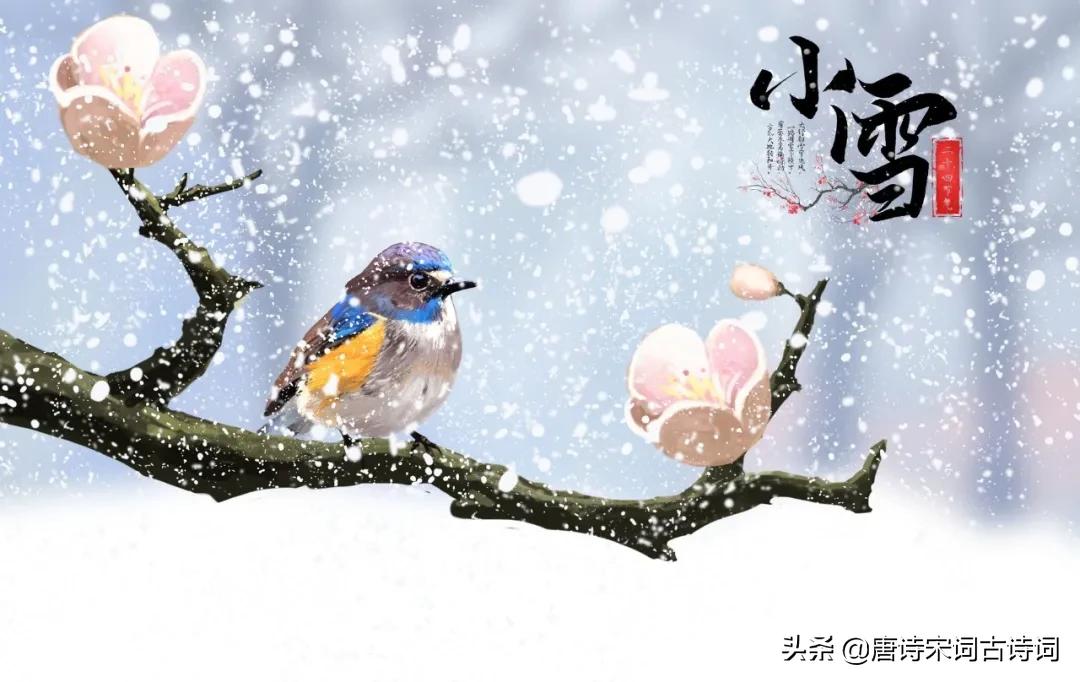
light snow
【Tang Dynasty】Qingjiang
Falling snow and wind are not tired of looking,
More fear of the forest.
The sorrowful man is under the window of the book,
A chill flew in.
The snow falling in the wind will not be tired of looking, and no matter how many snowflakes are afraid to cover the woods and mountains.
The sad man was sitting under the study window, and every snowflake that flew in aggravated the chill in his heart.
1. Light snow is one of the twenty-four solar terms, the second solar term in winter. Light snow is a solar term that reflects precipitation and temperature, and it is a solar term with a high frequency of cold waves and strong cold air activity.
2. Not tired: will not get bored.
3. Forest: Woods and peaks. Generally refers to mountain forest.
4. Sorrowful person: instructing people to worry; by extension, people who borrow wine to dispel their sorrows or a certain matter are difficult to solve. It also refers to people who are sad.
5. Book window: The window of the study.
This is a small snow poem by the Tang Dynasty monk Qingjiang.
According to the explanation of Xiaoxue in the "Moon Order • Seventy-Two Waiting Solutions": "In the middle of October, the rain is thinned by the cold, so it condenses into snow. The small ones are not prosperous. ”
In the middle of October of the lunar calendar, the weather is getting colder and colder, and the rain will condense into snow due to the cold, but the snow is not large at this time, so it is called "light snow".
The ancient book "Qunfang Genealogy" also explains Xiaoxue: "The snow is cold, and the snow is not cold, and the ground is not cold, and the snow is not big." ”
The snow season, when the snowflakes have just arrived, is also the time when the cold winter really arrives, which is very different from the scene of autumn.
This poem "Little Snow" by the monk Qingjiang depicts the scene of snowflakes flying on a snowy day.
The poet is undoubtedly very fond of this "falling snow and wind", and he says that he can't see enough.
I believe that many friends have seriously gazed at the window, they are so light, so serious, so beautiful, as if they are the embodiment of romance, the embodiment of purity, giving people endless poetry and imagination.
However, when the poet looked at it, he suddenly became worried, afraid that more snowflakes would cover the woods and mountains, causing snow disasters.
This "fear" is obviously only part of the "sorrow".
The poet's sorrow is not only worried about more snow, but also sorrow that the year is coming to an end, the end of the year is coming, and the time is fleeting.
The poet sitting under the window of the book looked at the snowflakes flying in, and each snowflake seemed to turn into the poet's sorrow.
Li Qingzhao wrote about sorrow, which is "only afraid of the Shuangxi ship boat, and cannot carry many sorrows", which makes the sad word have a sense of weight.
Qin Shaoyou's sad word is "flying red ten thousand points of sorrow like the sea", which makes the sad word have a sense of quantity.
Li Yu's "Just a river of spring water flows eastward" is also a sense of quantity of sorrow.
But the earliest thing that makes the word sad have a sense of quantity is Qingjiang's sentence "a piece of flying a piece of cold".
Each snowflake represents a sorrow, and the snowflakes flying in the sky can imagine the depth of the poet's sorrow.
It is said that monks should be empty of the four great powers, and it seems that Qingjiang has not practiced enough, allowing Melancholy to easily occupy the inner world.
Buddha's saying: Everything does not have to be too attached, everything follows fate.
Sorrow is because there is no penetration, and confusion is because it cannot be put down.
Only by learning to understand thoroughly can we let go.
Only through the desolation of life can we reach the prosperity of the soul.
May you and my little snow festival be able to reach the prosperity of the soul in the snow without worry.
About author:Yan Yong, Master of Arts, member of Jiangsu Writers Association, student of the third batch of the National Young Writers Class. He is currently the supplement editor of Taizhou Evening News and the editor of Daohe. He has published a collection of essays, "Reading Travel", a collection of literature and history, "Taizhou History: The City by the Salt River", and an essay collection "Wind and Rhyme Taizhou". More than 300 articles have been published.